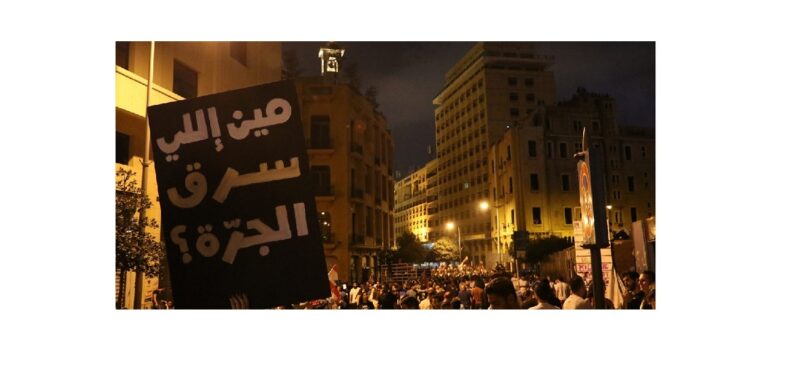Judge Abou Samra Drops Prime Minister Mikati’s Illicit Enrichment Case

On 3 February 2022, Acting First Investigating Judge in Beirut Charbel Abou Samra dropped the case against Prime Minister Najib Mikati and his associates for illicit enrichment through subsidized housing loans. On 23 October 2019, Appellate Public Prosecutor in Mount Lebanon Ghada Aoun had charged Mikati, his brother Taha, his son Maher, Bank Audi, the Audi-Saradar Group, and others, with illicit enrichment and other crimes stipulated in the Penal Code for their complicity in granting or receiving undue subsidized housing loans. This action constituted the first application of the Illicit Enrichment Law since the adoption of its original version in 1953 and occurred shortly after the outbreak of the October 17 Uprising. Although the Mount Lebanon Public Prosecution’s power to initiate the charges was widely debated at the time, Abou Samra dropped the case based on a different procedural argument (prescription). He thereby avoided investigating the case’s merits and whether Mikati and his associates committed the crime in question. Consequently, Mikati and his family benefited from these loans during his first term as prime minister and a decade later cleaned his slate during his second term.
Before analyzing this decision and its dimensions, we must mention that while the case was in court, the Illicit Enrichment Law was amended by Law no. 189 of 2020. The amendment expanded the concept of illicit enrichment, facilitated prosecution, and increased the penalties. In particular, Parliament removed the prescription period in order to underscore that these crimes have become so detrimental to society that trying them must become easier and their perpetrators must be denied the ability to invoke the right to have their crimes forgotten (prescription). The gravity of these crimes is evident from the financial and economic collapse. This collapse would never have occurred were it not for the decades of plundering, squandering, and mismanagement of public wealth, which the French magazine Le Monde called the “theft of the century”.
Nevertheless, Abou Samra allowed Mikati and his associates the privilege of having their actions, however serious, forgotten. Abou Samra not only ignored the new law but also twisted the old law’s provisions. The prime minister quickly commended the decision in a celebratory statement issued on April 7. The statement suggested that the judiciary had confirmed the “absence of any illicit enrichment or impingement on public funds” after thorough investigations, even though the charges were actually dropped based on prescription irrespective of their veracity.
Serious Legal Errors
The investigating judge’s argument for dropping the case was that the charges are misdemeanors subject to a prescription period of three years. The problem with the explanation is that he disregarded the new law and applied the old one without explaining why. Moreover, when applying the old law, he calculated the prescription period from the date the last loan was obtained (February 2012, when Mikati was still prime minister) without considering the date its effects ended or the date the crime was discovered, all in blatant violation of not only criminal law principles but also explicit provisions in both the old and new versions of the Illicit Enrichment Law.
While criminal law principles require the immediate application of the new law in such cases, the decision was erroneous irrespective of which law is applied. If we assume for the sake of argument that the old version of the Illicit Enrichment Law is applicable (as the decision held with no explanation), then the decision is erroneous for two key reasons:
- The judge calculated the prescription period from the date of the last loan contract without considering when the crime was discovered. He thereby blatantly violated the old version of Article 19, which stipulated that “the prescription period in cases of illicit enrichment, when it comes to recovering public funds, begins from the date the offense is discovered” (Article 19 of Law no. 154 of 1999). The housing loans scandal was only exposed by the media in summer 2018, and the Public Prosecution could only have discovered the truth of the contracts made for the defendants’ benefit after it viewed their content.
- The judge deemed that the criminal situation ended when the last loan was signed in 2012 without considering whether the effects of the loans had ended. Thus, he erroneously considered the alleged crime – granting and benefiting from subsidized loans – a momentary offense that occurs when the contracts are signed such that the prescription period begins at that instant. In reality, the crime’s effects continue throughout the repayment period. Hence, it is an ongoing crime whose prescription period only begins when the criminal situation ends – in this case, once the loans have been repaid at subsidized interest rates – per Article 10 of the Code of Criminal Procedure.
The Mikati family continues to benefit from the concessional loans as it is still repaying them over the long term at subsidized interest rates. Moreover, it is repaying the loans in Lebanese liras even though it obtained five of the nine in US dollars. This information was confirmed in late November 2019 when media close to Mikati leaked, in the course of defending him, that “most” of the loans had been repaid. Hence, by the end of 2019, these loans had not been fully repaid, and when the charges were filed in October that year, the prescription period had not even begun yet.
What goes for the application of the old law also goes, a fortiori, for the application of the new version. Article 13 of the new version states clearly and categorically that illicit enrichment is subject to no prescription period, thus emphasizing the need to effect accountability for these crimes and prevent their perpetrators from evading punishment or arguing that they should be forgotten because of prescription. This provision is justified by not only the gravity of these crimes but also the difficulty of bringing such cases against influential people, especially while they still occupy high positions. Seen in this light, removing the prescription period is a prerequisite for prosecuting officials who engage in illicit enrichment and manage to suppress any effort to hold them accountable while they are in power. For example, in Tunisia following the 2011 revolution, legislators removed the prescription period for all human rights violations during the dictatorial era via the Transitional Justice Law.
Furthermore, the principles and provisions applicable to this case dictate that the prescription period rule found in the new law be applied to all crimes on which no final ruling has been issued, especially crimes with ongoing effects (as in this case). Article 7 of the Penal Code explicitly stipulates that every new law – even if stricter – must be applied to ongoing, continuous, or successive crimes and habitual crimes that continue to be executed under its force. In principle, this applies to all crimes – whether momentary or ongoing – under Article 5 of the code of procedure, which stipulates that any amendment to trial procedure applies immediately (contrary to the principle of the nonretroactivity of penal texts). Whether prescription falls under trial procedure remains open to jurisprudential debate, but the new version of the Illicit Enrichment Law implied that it does when it addressed the rule in a special section titled “Investigation and Trial Procedure”. Late French scholar René Garraud agreed that changes to prescription should apply retroactively. After mentioning that prescription rules are determined and applied as society sees fit, such that the period is shorter for petty crimes and longer for serious crimes that should not be forgotten, he argued that they must be applied immediately to every crime on which no final ruling has been issued as they do not afford any acquired right to the perpetrator.[1]
Guardians of the System of Impunity
In short, Abou Samra’s decision to discharge the prime minister stands up to no serious debate. The decision is even more problematic for the following reasons:
- It was issued on the first prosecution of an illicit enrichment case. In other words, the Lebanese people waited 66 years for the first action on illicit enrichment, only for Abou Samra to swiftly disappoint them with a decision that restores the decades-old status quo, i.e. widespread impunity for grand corruption and illicit enrichment.
- The Public Prosecution, represented by Public Prosecutor in Beirut Ziad Abu Haidar, supported dropping the case based on prescription as the decision was issued in accordance with its submission. Thus, the Beirut Public Prosecution seemed to abandon defending public right, destroying the efforts by the Mount Lebanon Public Prosecution in this regard.
Finally, the Legal Agenda previously pointed out that Abou Samra is investigating judge in Beirut in acting capacity only. Since assuming this position, he has “distinguished” himself by dropping prosecutions against a significant number of influential figures. Hence, he is among the most prominent guardians of the system of impunity. Nevertheless, the competent authorities have so far taken no steps to investigate him or appoint a permanent judge to this pivotal position. Meanwhile, the highest-rated television programs belabor the errors of judges who open these cases while remaining almost utterly silent about those who close them.
A General Amnesty through Prescription?
Legislation following the collapse removed the prescription period from illicit enrichment crimes to underscore the need for accountability and for them to be remembered regardless of time passed, as previously explained. Yet the decision in question goes the opposite direction, discharging the defendants – one of whom still heads the executive branch – based on prescription and thereby restoring the privilege of having their crimes forgotten. Making matters worse, it is likely to be applied to all corruption and illicit enrichment crimes whenever the suspect argues that the prescription period (three years for misdemeanors, ten years for felonies) elapsed before the issuance of the new Illicit Enrichment Law in 2020.
From this standpoint, the decision is subversion of the law and the communal will that it reflects. Most importantly, it thwarts any effort to effect accountability for corruption, purge the public administration, and protect whatever public resources remain in the era of collapse. Hence, it bears symbolism no less dangerous than its practical effects. Let’s keep watching.
This article is an edited translation from Arabic.
[1] René Garraud, Traité Théorique Et Pratique Droit Pénal Français, 1913.




